Getting Into: King Crimson (Main Entrance)

| Written by: | Netzach |
| Published: | 02.01.2022 |
King Crimson ought not need any introduction. More often than not though, when I bring them up to fans of progressive rock/metal, they’ve either barely heard about the band, only heard their most popular songs, or never been able to get into them. How to remedy this? With an article like this one, of course! King Crimson have existed in various incarnations, and regularly changed their line-up. The one constant member (and mastermind) of the band has been the prolific guitar virtuoso Robert Fripp; an eccentric yet very British gentleman who used to be an interviewer’s worst nightmare (Fripp once snatched an interviewer’s notebook, read through the questions, found them entirely banal, and asked them to the interviewer instead for an hour). However, as much as Robert Fripp is King Crimson, this is not “Getting Into: Robert Fripp”.
King Crimson’s importance in the history of rock and metal cannot be understated. In fact, it cannot be overstated. Already on their debut, they were the originators of progressive and symphonic rock. Five prolific years later, they had been dealing in jazz fusion, heavy metal, Indonesian and British folk, avant-garde metal, grunge… While I’d argue that the best way to get into King Crimson is to start with their recent truckload of live albums, I decided to first focus on their studio discography. First, not to miss out on detailing their development over the years, and intricate ties to any number of corners of rock and metal history. Second, to not confuse any new listeners who would be essentially hearing set lists comprised of songs from three very different editions of the band. Third, the songs on their recent output are rearrangements, played with four drummers, with a modern production, and would not convey a coherent picture of a band whose main selling point is being the definition of “progressive”.
This band’s history begins before neither me nor you were even conceived of, let alone literally conceived, in the aftermath of a reinvention (the first of many) of a little-known British comedy rock troupe called Giles, Giles, And Fripp. This band’s history (probably, but you never know) ended not even a month ago, with their presumably last show ever in Tokyo.

2016, Filadelfiakyrkan, Stockholm, best concert I’ve ever attended
Enough introductions, this is a band that cannot be summed up succinctly. It is a band that often needs time to learn to appreciate. It is a band that was sometimes out of time, but will never go out of style. I bid you all welcome… to the Court of the Crimson King.
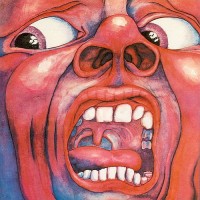
1969 - In The Court Of The Crimson King





The cover art is as iconic as the album itself. More epithets? Timeless, astounding, indispensable, classic… King Crimson’s debut single-handedly invented (or at least defined) both progressive and symphonic rock, incorporating bone-shattering riffs, jazzy brass shenanigans, and even some folk music here and there, with a rarely before heard of technical proficiency. Despite its complexity, abrasive nature, and challenging music and lyrics, it hit #5 and #28 on the UK and US charts, respectively, soon after its release. Perhaps playing their debut gig opening up for The Rolling Stones in front of 650 000 people at Hyde Park in London had something to do with it. How’s that for an entrance?
Moreover, how’s this for an entrance? The opening song, “21st Century Schizoid Man”, remains to this day one of the very finest examples of what progressive rock should be about. Sampled by artists such as Bad Religion, Aesop Rock, and Kanye West. Covered by a plethora of artists (Shining (NOR)’s being the best one I’ve heard). A legendary saxophone hook gives place to pounding drums as Greg Lake (who also produced the album) screams out Pete Sinfield’s disturbing lyrics about the Vietnam War (no less pertinent in these days): “Blood rack / Barbed wire / Politician’s funeral pyre / Innocents raped with napalm fire / 21st century schizoid man”. The mid-section consists of a saxophone riff progression backed up by the band in a manner I can only describe as spectacularly tight, and the song ends in free time, improvised noise. I can only wonder what this proto-metal behemoth of a song sounded like to listeners in 1969.
“Epitaph” and the title track are still some of the best and most recognisable; simply the symphonic rock anthems, and the title track is moreover a masterpiece of dynamic songwriting and storytelling. Peter Sinfield's lyrics tell abstract stories steeped in occult mythology (in fact, the band name itself is a euphemism for Satan), and while the lyrics were never King Crimson's main selling point, they would never paint such vivid, mysterious images in the mind of a listener as they did while he was in the band. While "Moonchild" is a point of contention for many people who do not appreciate the free-form improvisational style, most fans would agree it's a fantastic piece, starting out as a sweet ballad and evolving into a post-rock vibe of palpable tension. This is one of the best, and most important, rock albums ever, but it is not the best place to start if getting into King Crimson, especially not if coming from a metal background. Listen to Red first.

1970 - In The Wake Of Poseidon



King Crimson’s second studio album is not a bad one by any means. Had it switched places with the debut in the band’s chronology, In The Court Of The Crimson King would still have been the superior album, but perhaps not by quite as wide a margin. See, the songs on In The Wake Of Poseidon are mostly great (rather than excellent like the songs on the debut), and there’s nothing wrong with bands repeating themselves. Countless bands quickly find a formula that works for them and then sticks with it for their entire career, with only minor variations. Don’t fix what ain’t broken, right? Well, maybe don’t break what needs no fixing, either. Most of this album sounds like an attempt to recreate the genius of the debut, with only "Cat Food" (a playful, funky song marred by goofy vocals) and "The Devil's Triangle" (a cinematic, orchestral, terrifying epic which is easily the most interesting song on here) bringing anything new to the table.
The playful, don’t-give-a-shit vibe on “Cat Food” did template later actual hits such as “Easy Money” from Larks’ Tongues In Aspic, and the orchestral eeriness on “The Devil’s Triangle” was mixed with, you know, actual songwriting, to excellent effect on “Cirkus” from Lizard. In The Wake Of Poseidon has all the hallmarks of a transitional album; problem is, it transitions nowhere. Sure, nobody knew in 1970 that King Crimson would go on to be the progressive rock band, but in hindsight, there is no progression here, no reason to hear this rather than most other albums, and it can be saved for emergencies. You know, that moment bound to come where you’ll desperately crave a new King Crimson album, and realise that you never even heard this one. That moment will come, I assure you. Or you’re doing something wrong.
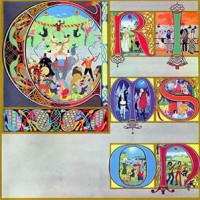
1970 - Lizard




Lineup changes were more common than not at this point in the band's career, and it resulted on an album that is as recognisable as it is alien, and as lovable as it is infuriating. Fripp's iconic and powerful mellotron makes "Cirkus" an incontestable banger, Sinfield’s cute-until-actually-studied lyrics perfectly accompanying the joyride between beauty and terror going on in the music. Then, Lizard runs into… problems. I’m not contesting the excellence of this album, but it tends to be annoying in all the ways you’d expect an avant-garde/progressive whatever band to be: the mindless self-indulgence on display here is stunning. In case I need to spell it out for you, have a look at the track list. Yeah, the vinyl-half-spanning closing song does not only include subheadings for its individual constituents, but pulls a fast one on Godspeed You! Black Emperor and even divides one of these subsections into subsubheadings. The sheer pretension!
To be fair, the half-hour-long title track “Lizard” (most often referred to as “The Lizard Suite” these days) works stunningly well live, even still, because much of the fluff tends to be cut out of it. The flute insanity puts Jethro Tull to shame, Keith Tippett’s piano performance rivals Chick Corea; it’s all of a very high quality. It just rarely ever gels, except the wonderful way it does on opening track “Cirkus”, which has remained a live staple since. Don’t start here, but do check it out when you’re starting to feel an urge for the deeper trenches. They run pretty deep, and this is just the beginning.

1971 - Islands




I did mention this band was way more prolific than the teenagers who are behind on their rent for using your garage, didn’t I? Not in those exact words, maybe. It’s up to you to make them losers pay their rent, anyway (and stop using your dad’s car as a drum kit). Two years after forming, and already four albums in. Must have been something in the water. It’s not the same band that made In The Court Of The Crimson King at all, though. I mean, neither was any other album. This is commonly regarded as the final album by the second incarnation of King Crimson (but who keeps count, anyway? Actually, I do) and is their most restrained and tastefully not-entirely-wacky effort since the debut. However, to really understand the power of most songs here, I heartily recommend you check out any of the recent live albums.
The production on Islands is by no means bad, but Greg Lake left to form Emerson, Lake & Palmer, and new singer Boz Burrell (of later Bad Company fame) is no doubt the weakest singer to front King Crimson. Also, aspects such as his incredibly sexy bassline driving “Sailor’s Tale”, Mel Collins’ saxophone mayhem in “The Letters”, and the timeless, symphonic anthem that is the title track, simply come off much better with a modern production, and with give-or-take a hundred decades of afterthought on account of the (by now) eighth incarnation of the band. “Prelude: Song Of The Gulls” is, interestingly, an adaptation of “Suite No. 1” from Giles, Giles, And Fripp’s 1968 work, which was, of course, the comedy rock band that would later adopt the moniker King Crimson and start to play some serious music.

1973 - Larks’ Tongues In Aspic





Now we’re talking. Larks’ Tongues In Aspic is the first album recorded with the band’s third line-up, which would turn out to be responsible for some of their very best material. This is still a kind of frustrating album, but it is also here that King Crimson can be heard to seriously start flirting with heavy metal. I’d even argue it is the first progressive metal album ever made (Wikipedia categorises it as avant-garde metal, which, I guess, is not wrong either). On this album, the band take their first steps towards evolving into the prog metal beast they have long since turned into.
Yeah, there’s a big metal influence, but there is also a lot of American jazz. King Crimson never settled for doing anything the easy way, no sir. New percussionist Jamie Muir (who would soon quit to become a monk in Scotland, or something) is equal parts splendidly professional and absolutely insane. John Wetton on bass and vocals is the best vocalist they ever would have The sheer range of gear and timbre he employs is nothing short of mind-boggling, and polyrhythms and unusual sounds abound, and on top of that they also had a regular drummer (as opposed to percussionist) in the form of Bill Bruford, who joined in 1972 after growing increasingly bored by playing in Yes.
Here, the band sounds more energised than ever, and while the second and third tracks do little for me still, the rest of it is pretty flawless. The music does the album title service, often playing on a quiet/loud-dynamic and frequently utilising violinist David Cross’ psychotic soloing antics. “Larks’ Tongues In Aspic, Part 2” remains an extremely influential progressive rock/metal song (but stay clear of the Dream Theater cover version, it is pretty meh), “The Talking Drum”... does what the title implies (and sounds absolutely massive live with their recent line-up featuring… lots of drummers), and “Easy Money” pretends to be a silly song until it shows they mean serious business. Especially “The Talking Drum” and the both title tracks are mandatory listening (still, I repeat, start with Red).

1974 - Starless And Bible Black




As live improvisation became more and more a feature of King Crimson, as well as extensive touring escalating tension between the members and reducing the time available for actually composing new material, the band decided to release some better live improv performances (along with a couple of new songs). The result was Starless And Bible Black, which remains terribly underrated in their discography. Maybe due to not truly being a studio album (although it was always promoted as such) since only “The Great Deceiver” and (half of, I think) “Lament” were composed and recorded in studio. The rest of these cuts were recorded live and then extensively dubbed and mixed to sound like a studio album.
“The Great Deceiver” is one of the most jovial, entertaining songs King Crimson would ever write, and while you’d be forgiven for being sceptical towards some of the more jazzy, avant-garde improv pieces on here, I’d suggest you opt for just letting it convince you. Especially noteworthy is how “Fracture” (who inspired a guitarist to write a book about how it took him 22 years to learn on the guitar) remains a rare, but always impressive, addition to the band’s set lists (though Fripp famously stated that they only dare to choose this one occasionally, as practising it takes up literally 90% of their rehearsal time). I cannot even begin to figure out how such a piece even begins to come together, and that’s way before taking into account it was pretty much entirely improvised.

1974 - Red





Start here. Seriously.
Why? Read my full review here, or just settle for the abridged version: this is one of very few albums I won’t hesitate to slap a casual 10/10 rating on and then expect everybody else to agree with me. As I am listening to the opening riff of “Red” for the seventy-eleventh time, I am within moments entirely enthralled by the iconic 7/4-time riff, the massive, interlocking drums, and the wildly precise performance. You don’t have to listen to more than a few seconds of opener “Red” to understand where some of your favourite progressive rock and metal bands come from.
The crowning jewel is the closing track, “Starless”. It is not only King Crimson’s best song; it is the best progressive rock song there ever was, and if you’d put a gun to my face (please refrain) and ask me what the single best song ever written in the history of music was… I’d answer, “Starless”. Opening with a mellow jazz section, with vulnerable singing and mournful saxophone that throws back to “Fallen Angel”, it soon evolves into a section of palpable tension. Robert Fripp plucks his guitar in polyrhythmic staccatos over a grungy bass line, tension building, building, building… until the saxophone blasts off into a genius, wild solo, the drums pummel all over the place, and a bassline in 13/8-time carries Red to the closing moments.
At this point in King Crimson’s history, nobody in the band got along. David Cross had already left during the previous tour, and the band had been reduced to the trio seen on the cover. Robert Fripp ate his meals separate from the band, and would later disband the group, proclaiming they were never to return. They would, of course, in the 80s incarnation of King Crimson, with Discipline, in a very, very different style.
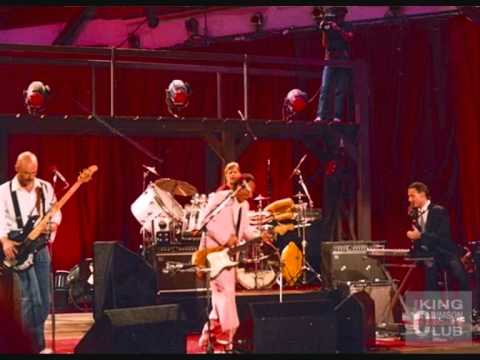
The 1981 line-up, and a very pink shirt

1981 - Discipline





New decade, new members, new style. Discipline saw Fripp unite with second guitarist Adrian Belew (Talking Heads), bass virtuoso Tony Levin (who also introduces the world to the touch-screen version of a bass guitar here, the Chapman stick, which enables some truly impressive feats), and kept drummer Bill Bruford in rotation. This sounds nothing like the band did in the 70s, however. Yeah, the progginess of it all might still leave you with a slight (desirable) headache listening to this, but it’s the most fun King Crimson ever sounded, and, hell, it’s at times even properly danceable.
The “interlocking drums” style used by many later progressive rock and metal bands was crystallised here. Various polyrhythms that seem at first indecipherable come together in a math rock way, inspiring bands such as Tool and Meshuggah alike. There is no metal left in the band’s sound here (it would resurface in the 90s), but the music, when not wonderfully atmospheric and moody (such as on “Matte Kudasai” and “The Sheltering Sky”), is scathingly complex (“Frame By Frame”, “Discipline”), intelligently playful (“Indiscipline”, “Thela Hun Ginjeet”), and Belew’s more extravagant, avant-garde sound palette (listen to “Elephant Talk” already) plays off Fripp’s more rhythmic, calculating style perfectly.
Yeah, proclaim you’re over with, after having released a masterpiece like Red, spend nearly a decade reinventing yourselves as a different type of band entirely, and return with one of the most forward-thinking, astonishing albums of the 80s and your career. You do you, King Crimson, and you won’t find me complaining even slightly. Check out Discipline after familiarising yourself with Red and the debut album. I doubt you will regret it, and should you regret it, man, form a better opinion, would you? If there was ever any doubt, this is what “progressive” should be all about.
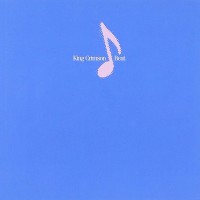
1982 - Beat


Now, this is where those warning labels I forgot to pay for would have been useful. I could hardly say that any King Crimson album is truly terrible, but if there were one, this would be the one. Not only is their style a watered-down take on Discipline’s brilliance, it is literally painful to hear how a band that presumably never gave a shit about what anybody else thought of them is so obviously trying hard to remain relevant, or, gasp, even trying to capitalise on earlier success. Nobody likes this album. Not even the band; only “Neurotica” was salvageable for continued live performances, and in a quite heavily modified version. I don’t want to even keep talking about this album, next.

1984 - Three Of A Perfect Pair



I said, “next”, damn it. Why am I still hearing Beat? Oh, I’m not. Just a slightly less bad version of the absolute ass-end of a five-decade-plus mostly stellar discography. Three Of A Perfect Pair sees the band chug out more of the Discipline stuff, but, as was the case on Beat, without any of the actual discipline obviously involved in the making of the first 80s album. “Nuages (That Which Passes, Passes Like Clouds)” is a good, atmospheric piece, and “Sleepless” is a cute and enjoyable song, but like Beat, this is the sound of a band absolutely not made for airtime on MTV trying ridiculously hard to… earn airtime on MTV, or something. I don’t know if MTV existed in 1984, but you get the point. This album, indeed, passes like clouds (as opposed to Beat, which literally passes clouds… get it?).
There is no reason to listen to either Beat or Three Of A Perfect Pair, because you’re not likely to grow bored by Discipline within the next century, and there’s not even anything new being done on these two albums that King Crimson already hadn’t perfected in 1981. They split up again soon after (probably “never to return”) and would stay off the grid for over a decade, before returning with a sound that would later develop into the best amalgamation of everything they’d previously been dabbling in.
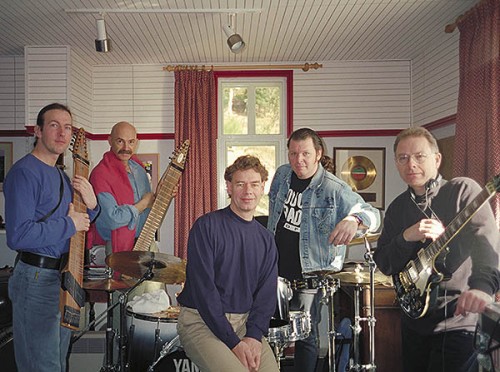
Old men, new music
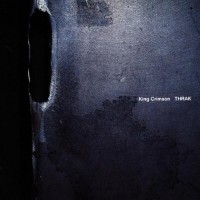
1995 - Thrak




Having dabbled in various ambient and electronic projects, such as Fripp & Eno, invented the Frippertronics method of creating soundscapes, and designed the system audio for Windows Vista, Robert Fripp had long had a good way for staying relevant. It took until the mid-90s for him to begin truly implementing an electronic edge to King Crimson’s sound. Although electronic drums and the Chapman stick, among other instruments, had been part of the band since at least Discipline, they had been such more as features enabling the members to play all that gnarly stuff rather than an integral part of the sound. Enter the 90s (hey, even I’m alive at this point!), where King Crimson yet again reinvent themselves.
Thrak displays the coalescence of many of the band’s greatest traits since their not-so-humble beginnings back in 1969. Aptly titled “Vrooom” builds on the dark, crushing prog metal vibe of Larks’ Tongues In Aspic and Red, mixes it up with the ambience and math rock mayhem of Discipline, and introduces a focus on industry-jazz (poly)rhythms and forceful noise that would later serve as the template for the re-(re-re-)re-imagined King Crimson touring in 2016-2021. “B’boom” is the best song on here, and the title track is wonderfully insane. Even the ballad “Dinosaur”, which is literally about staying relevant, is highly enjoyable. It’s a bloated album, and not perfect; we would have to wait 8 more years for this sound to come together in all its glory, but it’s a hell of a good album, and a hell of a way to make a comeback statement.

2000 - The Construkction Of Light



King Crimson... split up again, but this time for the sake of progress. The result? Mixed. After Thrak, they intentionally splintered into several ProjeKcts (to be covered another time, perhaps) to accumulate influences. The only noteworthy improvement made to their sound on The Construkction Of Light, however, was Pat Mastelotto’s notable electronic drum arrangements, which were put to much better use on their next (swansong) album. Some noteworthy un-improvements were made, as well, particularly in the production department. Robert Fripp tends to write off the album as a necessary misstep on the road to solidifying their artistic vision on The Power To Believe, which makes sense, but makes this album nonetheless quite forgettable. The title track works well live, though, I will give them that. Unlike Beat, their other notable misstep, this one doesn’t infuriate as much as it falls completely flat, though. Moving on…

2003 - The Power To Believe





While properly disbanding after the 2021 tour, not even one month ago, this remains the final studio album by the band, and boy is it a great way to go out in style! Mastelotto’s electronic drum patterns swirl and glitch around crushingly heavy math rock riffs. Tool-inspired (yes, the influence was mutual at this point, according to Fripp) basslines and guitar picking ensure there will never be something new to hear in multi-layered songs like the live favourite “Level Five”, which recalls the iconic riff of “Red” but with a very modern touch. “Dangerous Curves” is one of my absolutely favourite songs in their vast discography, building on the same sort of crescendo that made “The Talking Drum” or Pink Floyd’s “One Of These Days” such bangers. “Happy With What You Have To Be Happy With” features the most ridiculous lyrics ever put to tape, literally just describing the process of writing lyrics for songs, but is one of the catchiest songs they ever were to write.
Moreover, the sound palette of The Power To Believe would go on to play a huge importance in King Crimson’s revival between 2016-2021, where a line-up of seven members (later expanded to eight), of which three were percussionists (later expanded to four), would resurface to reinvent their entire musical portfolio in a most spectacular way.
I’d still argue that the best way to get into King Crimson, or at least to understand them, is to get familiar with live albums, such as USA, Earthbound, The Night Watch, and literally any or every album post-2016, but this is already extensive enough, so get to have fun with that another time. I put together a studio output Spotify playlist, sort of ordered in a way I think would be appropriate for a metalhead to catch on to the band. Feel free to check it out below, and if you don’t catch on, well, the joke’s on you.
King Crimson are one of the most important bands in rock and metal, some of the most skilled musicians that ever came together, and possibly the greatest band that ever walked this Earth. If you think this sounds like hyperbole, think again, or better yet, just go ahead and listen to them already. I think you will want to stick around In The Court Of The Crimson King (but, seriously, start with Red).
Comments
Comments: 14
Visited by: 118 users
| Bad English Tage Westerlund |
| RaduP CertifiedHipster |
| Netzach Planewalker |
| musclassia |
| nikarg |
| Bad English Tage Westerlund |
| AndyMetalFreak A Nice Guy |
| Daniell _爱情_ |
| zeromus44 |
| Callisto |
| nikarg |
| Deadsoulman |
| Netzach Planewalker |
| JoHn Doe |
Hits total: 3007 | This month: 28





 apos;'
apos;'



